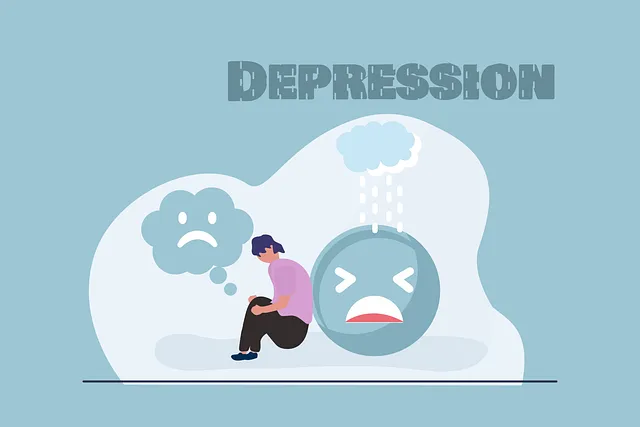The Kaiser Permanente Mental Health Access Center Colorado Springs is a specialized hub offering evidence-based and innovative services for holistic mental wellness, including stress management workshops and diverse therapeutic modalities. Program evaluation, using KPIs like accessibility, effectiveness, and impact, measures initiatives' success. A dual-method approach combines quantitative (surveys, KPI tracking) and qualitative (interviews, focus groups) techniques for comprehensive client outcome assessment. This process drives continuous improvement, guiding resource allocation and new program development, such as expanding Compassion Cultivation Practices training and self-care workshops.
The Kaiser Permanente Mental Health Access Center in Colorado Springs serves as a model for comprehensive mental wellness programs, highlighting the growing importance of evaluation methods in this sector. This article explores the significance of program evaluation in enhancing mental health services, focusing on key performance indicators and methodologies to measure client outcomes and satisfaction. By examining findings from these evaluations, we discuss strategies for continuous improvement, ensuring the center’s initiatives remain effective and aligned with community needs.
- Understanding Kaiser Permanente Mental Health Access Center Colorado Springs
- Importance of Program Evaluation in Mental Wellness Initiatives
- Key Performance Indicators for Measuring Success
- Methodologies for Assessing Client Outcomes and Satisfaction
- Continuous Improvement Strategies Based on Evaluation Findings
Understanding Kaiser Permanente Mental Health Access Center Colorado Springs

The Kaiser Permanente Mental Health Access Center Colorado Springs is a specialized hub dedicated to enhancing mental wellness and addressing diverse psychological needs within the community. This center plays a pivotal role in promoting holistic mental health by offering a range of services tailored to individuals, families, and organizations. Among its notable initiatives are Stress Management Workshops designed to empower participants with coping strategies for everyday pressures.
Here, mental health professionals employ evidence-based practices and innovative approaches to foster resilience and well-being. By integrating various therapeutic modalities, the center caters to a broad spectrum of concerns, from stress management and anxiety reduction to more complex issues. Furthermore, it prioritizes inclusive care, ensuring that services are accessible and tailored to meet the unique needs of each individual or group, aligning with the broader objectives of effective Risk Management Planning for Mental Health Professionals.
Importance of Program Evaluation in Mental Wellness Initiatives

Program evaluation is a cornerstone in measuring the effectiveness and impact of mental wellness initiatives, such as those offered at the Kaiser Permanente Mental Health Access Center in Colorado Springs. It plays a pivotal role in understanding what works, identifying areas for improvement, and ensuring resources are allocated efficiently. By employing robust evaluation methods, the center can assess the success of its programs, including burnout prevention strategies and community outreach efforts aimed at resilience building.
Through comprehensive evaluation, the Kaiser Permanente Mental Health Access Center can track progress, gain valuable insights, and make data-driven decisions. This approach is essential for continuous improvement and adapting services to meet the evolving needs of the community. By evaluating program outcomes, the center can showcase its commitment to excellence and demonstrate the tangible benefits of its mental wellness initiatives to stakeholders and funding sources.
Key Performance Indicators for Measuring Success

Evaluating a mental wellness program, such as those offered by the Kaiser Permanente Mental Health Access Center in Colorado Springs, requires well-defined Key Performance Indicators (KPIs) to measure success and impact. These KPIs should encompass various aspects of program delivery and outcomes, ensuring a comprehensive assessment. One critical KPI is the accessibility and reach of services, gauged through metrics like the number of individuals served, wait times, and coverage across diverse demographics.
Additionally, the effectiveness of specific interventions, such as Mental Health Education Programs Design, including Mindfulness Meditation techniques, can be assessed by tracking participant engagement and satisfaction. Public Awareness Campaigns Development initiatives might focus on increasing community participation, knowledge, and positive attitudes towards mental health, measured through surveys and social media analytics. These KPIs allow for continuous improvement, ensuring that programs are tailored to meet the unique needs of the population they serve.
Methodologies for Assessing Client Outcomes and Satisfaction

Evaluating client outcomes and satisfaction is a vital component of any mental wellness program, offering valuable insights to improve services. At the Kaiser Permanente Mental Health Access Center Colorado Springs, a comprehensive approach is adopted, integrating both quantitative and qualitative methodologies. Quantitative methods involve surveys and metrics tracking key performance indicators (KPIs) such as symptom reduction, treatment adherence, and client retention rates. These data-driven assessments provide tangible measures of program effectiveness, allowing for informed decision-making and resource allocation.
Qualitative techniques, including interviews and focus groups, offer a deeper understanding of clients’ experiences and perceptions. By exploring their journeys, challenges, and perceived benefits, healthcare providers gain valuable insights into the impact of the program on individuals’ mental wellness. Integrating these qualitative findings with quantitative data enables a holistic evaluation, informing not only service improvements but also guiding the development of tailored interventions, such as enhancing burnout prevention strategies for healthcare providers and fostering inner strength development, as highlighted in the context of the Risk Assessment for Mental Health Professionals.
Continuous Improvement Strategies Based on Evaluation Findings

The evaluation process is a powerful tool for driving continuous improvement within mental wellness programs, such as those offered at the Kaiser Permanente Mental Health Access Center in Colorado Springs. By systematically analyzing program effectiveness, center leaders can identify areas of success and pinpoint aspects that require refinement. This data-driven approach ensures resources are allocated optimally to enhance client outcomes. For instance, if an evaluation reveals high client satisfaction with the Compassion Cultivation Practices, further investment in training facilitators and expanding these sessions could be prioritized.
Similarly, Self-Care Routine Development for Better Mental Health might emerge as a key area of focus based on feedback. Program evaluators can collaborate with mental health professionals to design tailored self-care programs that cater to diverse client needs. Promoting Positive Thinking through structured workshops or group discussions could also be a strategic outcome, empowering individuals to cultivate resilience and improve their overall well-being.
The evaluation of mental wellness programs, such as the Kaiser Permanente Mental Health Access Center in Colorado Springs, is paramount for ensuring their effectiveness and adaptability. By employing key performance indicators and methodologies that assess client outcomes and satisfaction, initiatives like this one can continuously improve services based on real-world data. This iterative process not only enhances the well-being of individuals seeking mental health support but also contributes to the broader goal of revolutionizing healthcare accessibility in today’s digital era.






